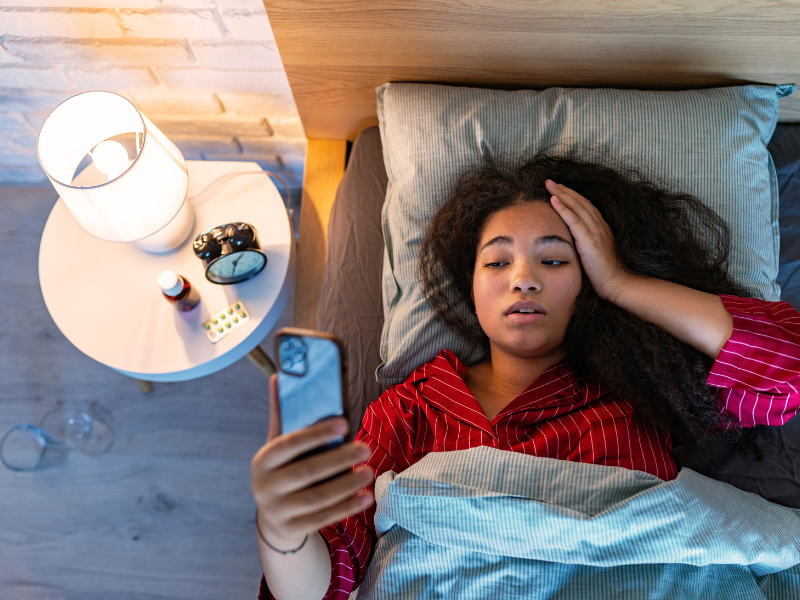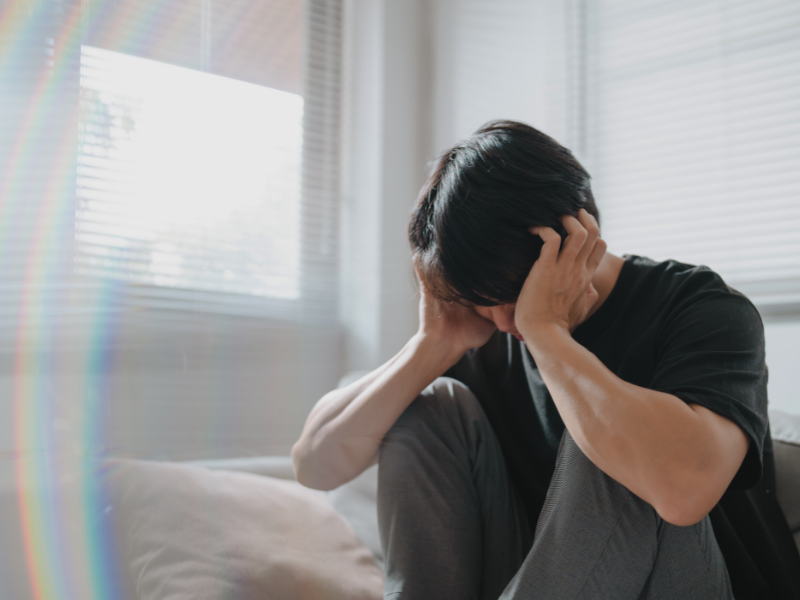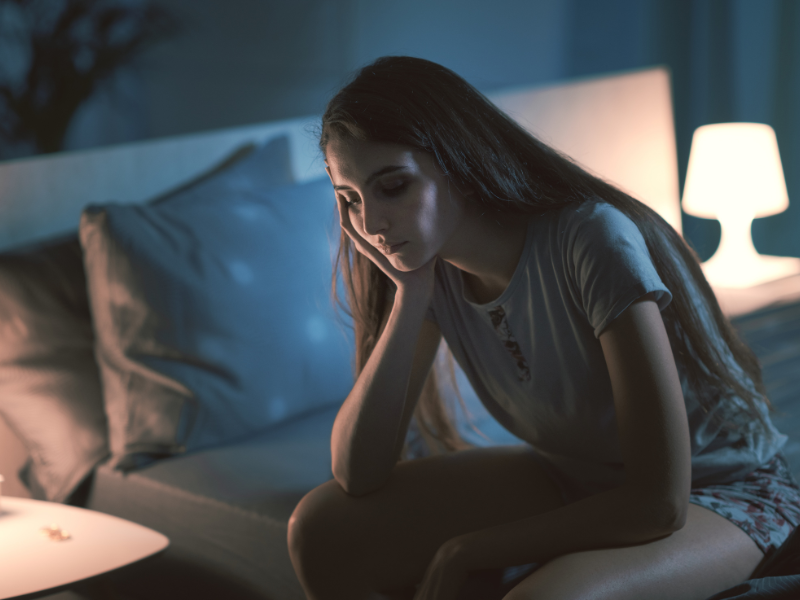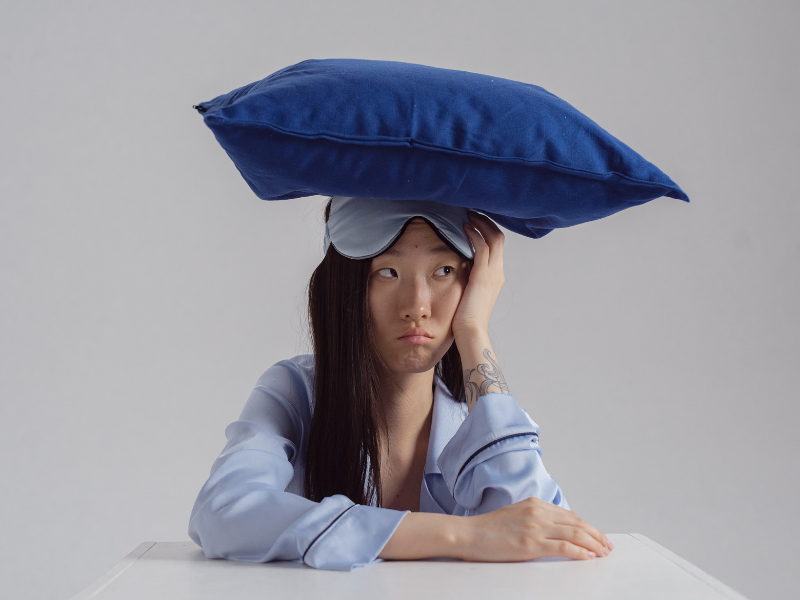


Imagine a day packed to the brim with running errands from morning to night, juggling work deadlines, and barely catching a breath. By the time it’s all over, you’re utterly drained and more than ready to collapse into bed. But just as your head hits the pillow, sleep refuses to come— a frustrating experience that those with insomnia struggle with.
If this scenario happens to you often, you might wonder why it happens. Here are 8 common reasons why you may feel tired but can’t sleep and what you can do about it.

Struggling to sleep even though you’re tired all day is probably one of the worst experiences we all had at least once.
There’s usually a good reason for why it happens. Here are 8 common factors that are contributing to your sleep problems:
Poor sleep habits or poor sleep hygiene can be a reason why you have difficulty falling asleep despite being exhausted.
Examples of poor sleep habits include taking too long of a nap, not getting enough sleep during busier periods, and sleeping at different times. All of these can affect your body’s sleep-wake cycle, making it challenging for you to get restful sleep and wake up refreshed.

Stress and anxiety are also a significant factor that can affect the way you sleep. According to a Baylor College of Medicine sleep expert, high-stress levels can make it harder for you to fall asleep and also cause sleep fragmentation [1].
It’s important to keep your stress levels at a minimum by modifying your nighttime behaviors and ensuring that you have incorporated relaxation techniques into your daily life.
Depression and sleep are very much interconnected. People who are diagnosed with insomnia, have a higher risk of developing depression compared to those who get a good night’s sleep on a regular basis.
Among those with depression, at least 75% of them have reported trouble sleeping or staying asleep at night [2]. Depression can lead to a person getting a shorter amount of deep sleep, more nighttime arousal, and trouble falling back to sleep.
Electronic devices are a permanent part of everyday life for most people. However, with the increased use of these devices, it has also led to an increased report of sleep deprivation [3].
The reason for this is due to blue light being emitted from the electronic devices. Blue light suppresses the secretion of the sleep hormone, melatonin. In turn, this affects the regulation of our body’s circadian rhythm, negatively affecting our sleep quality at night [4].
Therefore, it is better to limit the use of mobile phones and all electronic media 2 to 3 hours before sleep.

Consuming caffeine in excessive amounts or consuming it right before bed can lead to massive sleep disturbances.
It is a stimulant that can make it hard for you to fall asleep as well as lead to delayed sleep phase syndrome. Even consuming it earlier in the day can have effects that last till nighttime [5]. Thus, it’s best to limit your caffeine intake and consume it only in the morning if you need to.

Another possibility of why you may not be able to sleep could be a result of underlying sleep disorders such as chronic insomnia, sleep apnea, or circadian rhythm disorders.
Having a hard time falling asleep at night or frequent arousals are common insomnia symptoms. If you believe that you may have a possible sleep disorder, it’s best to speak with a sleep specialist for proper diagnosis and treatment.
You may also download a sleep tracking app such as ShutEye® to keep track of your sleep cycle and to see if you have any symptoms that are similar to those of insomnia.

The diet also plays a huge part in sleep problems. Eating heavy meals late at night could cause you to not be able to fall asleep. Your body typically needs at least a few hours to digest the food that is being consumed.
Sleeping right after eating can lead to indigestion or heartburn. In addition, drinking too much fluids just before bedtime can disrupt sleep at night.
For women, hormonal imbalances can affect sleep quality. Women with polycystic ovary syndrome (PCOS) for instance, experience higher levels of testosterone and lower levels of progesterone. These imbalances in hormones can increase sleep difficulties.
Menopause also causes hormone fluctuations which leads to less time being spent in rapid eye movement (REM) sleep. As a result, this disrupts the ability to get a good night’s rest.

Once you have found the root cause of your sleepless, tired nights, the next step is to prioritize self-care and focus on building healthy sleep habits to manage problems with sleep.
Here are 7 remedies that can help you reduce the frequency of this issue:
One of the things that many sleep experts recommend for those who are unable to sleep at night is to get out of bed. Don’t attempt to force yourself to sleep if you still feel awake [6].
Staying in bed when you are not tired yet causes your brain to associate your bed with wakefulness [7]. Instead, if you are not ready to sleep, it’s best to get up and engage in relaxing activities that can help boost melatonin production.
In conclusion, if you can’t sleep even when you’re tired, something is probably interfering with your sleep-wake cycle, like a bad diet, poor sleep habits, or too much stress. However, it can also be a symptom of some underlying health issues.
Try improving the way you sleep at night with the ShutEye® app. ShutEye® is a science-backed sleep app that tracks your sleep cycle and offers sleep insights to help you achieve better sleep.
American Academy of Sleep Medicine (2018) Sleep and caffeine [online]. Available at: https://sleepeducation.org/sleep-caffeine/
American Academy of Sleep Medicine (2021) Can’t sleep? Do this, not that! [online]. available at: https://sleepeducation.org/cant-sleep-do-this-not-that
Dusang, K. (2019) How stress can affect your sleep [online]. Available at: https://www.bcm.edu/news/how-stress-can-affect-your-sleep
Hysing M, Pallesen S, Stormark KM, Jakobsen R, Lundervold AJ, Sivertsen B. Sleep and use of electronic devices in adolescence: results from a large population-based study. BMJ Open. 2015 Feb 2;5(1):e006748. doi: 10.1136/bmjopen-2014-006748. PMID: 25643702; PMCID: PMC4316480.
John Hopkins Medicine (2024) Depression and Sleep: Understanding the Connection [online]. Available at: https://www.hopkinsmedicine.org/health/wellness-and-prevention/depression-and-sleep-understanding-the-connection
John Hopkins Medicine (2024) Up in the Middle of the Night? How to Get Back to Sleep [online]. Available at: https://www.hopkinsmedicine.org/health/wellness-and-prevention/up-in-the-middle-of-the-night-how-to-get-back-to-sleep
Silvani MI, Werder R, Perret C. The influence of blue light on sleep, performance and wellbeing in young adults: A systematic review. Front Physiol. 2022 Aug 16;13:943108. doi: 10.3389/fphys.2022.943108. PMID: 36051910; PMCID: PMC9424753.